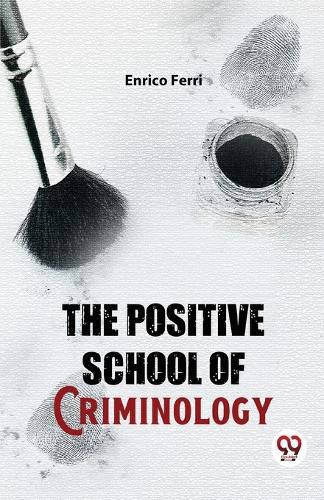Readings Newsletter
Become a Readings Member to make your shopping experience even easier.
Sign in or sign up for free!
You’re not far away from qualifying for FREE standard shipping within Australia
You’ve qualified for FREE standard shipping within Australia
The cart is loading…






This title is printed to order. This book may have been self-published. If so, we cannot guarantee the quality of the content. In the main most books will have gone through the editing process however some may not. We therefore suggest that you be aware of this before ordering this book. If in doubt check either the author or publisher’s details as we are unable to accept any returns unless they are faulty. Please contact us if you have any questions.
The Positive School of Criminology by Enrico Ferri is a key publication that contributed to the development of criminology as a scientific field. The positivist school, which claimed that all human behavior, including criminal conduct, could be explained by natural causes, set out to create a new method for studying crime that was founded on these ideas.According to Ferri, a mix of social, biological, and psychological variables contribute to criminal conduct. He held the view that criminals were not born, but rather produced, and that society had a duty to address the underlying factors that contribute to crime. The Positive School of Criminology made a substantial contribution to the study of criminology and changed how crime was investigated and comprehended for the better. Ferri's theories contributed to the change in criminology's emphasis from retribution and punishment to prevention and rehabilitation. His research cleared the path for more scientific methods to crime detection, investigation, and prevention, which had a significant impact on the evolution of the criminal justice system. The Positive School of Criminology is still regarded as a significant book in the history of criminology and is still researched and discussed by academics today, despite certain critiques of Ferri's theories, notably with regard to his emphasis on the relevance of biological variables in criminal conduct.
$9.00 standard shipping within Australia
FREE standard shipping within Australia for orders over $100.00
Express & International shipping calculated at checkout
This title is printed to order. This book may have been self-published. If so, we cannot guarantee the quality of the content. In the main most books will have gone through the editing process however some may not. We therefore suggest that you be aware of this before ordering this book. If in doubt check either the author or publisher’s details as we are unable to accept any returns unless they are faulty. Please contact us if you have any questions.
The Positive School of Criminology by Enrico Ferri is a key publication that contributed to the development of criminology as a scientific field. The positivist school, which claimed that all human behavior, including criminal conduct, could be explained by natural causes, set out to create a new method for studying crime that was founded on these ideas.According to Ferri, a mix of social, biological, and psychological variables contribute to criminal conduct. He held the view that criminals were not born, but rather produced, and that society had a duty to address the underlying factors that contribute to crime. The Positive School of Criminology made a substantial contribution to the study of criminology and changed how crime was investigated and comprehended for the better. Ferri's theories contributed to the change in criminology's emphasis from retribution and punishment to prevention and rehabilitation. His research cleared the path for more scientific methods to crime detection, investigation, and prevention, which had a significant impact on the evolution of the criminal justice system. The Positive School of Criminology is still regarded as a significant book in the history of criminology and is still researched and discussed by academics today, despite certain critiques of Ferri's theories, notably with regard to his emphasis on the relevance of biological variables in criminal conduct.